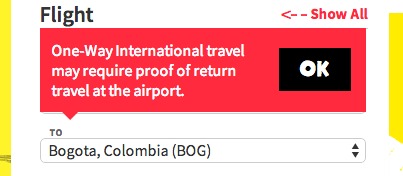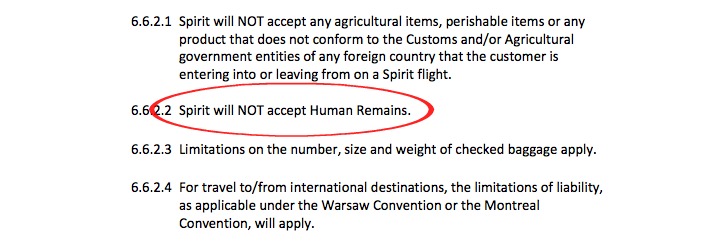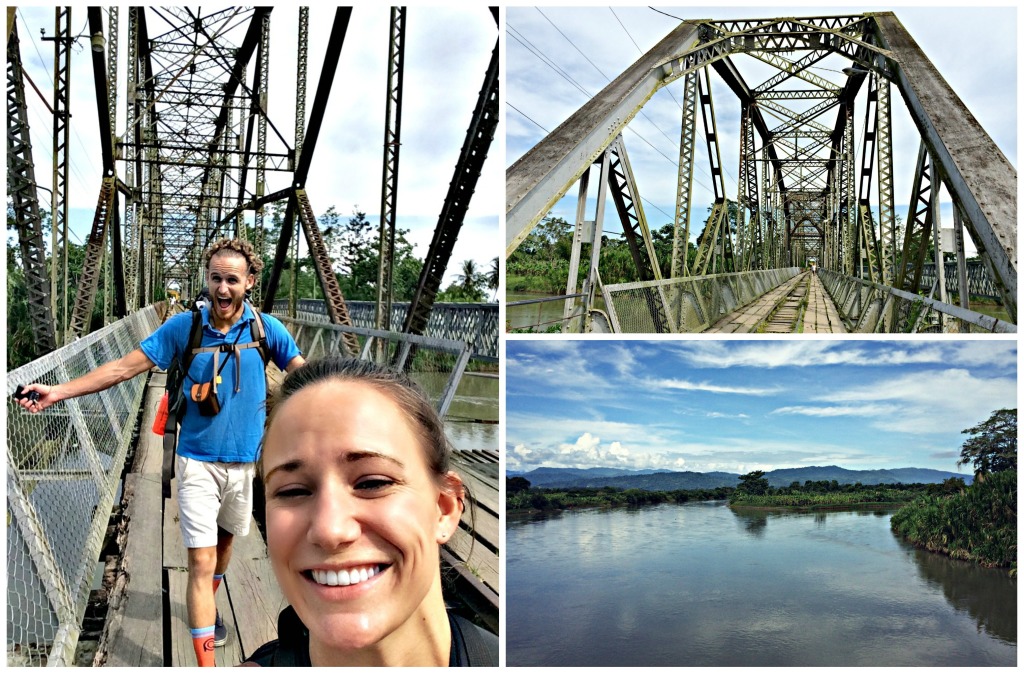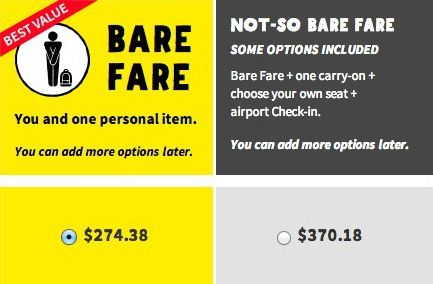Bare Fare: You and one personal item. You can add more options later.
The Bare Fare is just the cost of getting you from A to B–not your bags.
Bags are more expensive at the airport.
We give you the freedom to choose your perfect seat as an optional service.
A $10 Boarding Pass Service will be applied to customers who choose to have their boarding pass printed by an agent at domestic airports.
One-way international travel may require proof of return travel at the airport.
If any of the above sounds familiar to you, then at one time or another you’ve paid your budget traveler dues by flying with Spirit Airlines, the most hated airline (yet somehow the most profitable?) in the United States.
Nickel-and-diming certainly comes to mind when most people think of Spirit Airlines, and having just flown with them for the first time myself, I have no choice but to agree.
It’s the kind of online booking experience that’ll make your eyeballs crack and bleed in your attempt to read all the microprint, making absolutely sure you’re complying with every little rule so as to not get slapped with extra fees upon arrival at the airport.
For example, your bags, should you decide not to pay for them (or neglect to) until you get to the airport? They’re not just more expensive at the airport, they are f$&%ing expensive. How expensive, you ask?
One. Hundred. Dollars. Each. Carry-on, checked bag, doesn’t matter. Didn’t read the fine print? Pay up, bitch.
Now, in Spirit’s defense, their efforts to cram as many sardines passengers as physically possible onto every flight at the expense of legroom, reclining seats and comfort of any kind and offer all in-flight snacks at redonkulous premium prices DO suggest they’re attempting to operate in a socially responsible and environmentally friendly way…or something.
According to a 2013 report by the International Council on Clean Transportation (ICCT), they’re the second-most fuel-efficient airline after Alaska. The Spirit website claims in-flight materials like cups and napkins to be environmentally friendly, and I’m guessing since no one buys food or drink on most flights anyway their waste production must be exceptionally low.

But if you’re diligent enough and have a high tolerance for eyeball bleeding, you can avoid those fees and even find some unexpected perks.
Spirit or Delta?
When booking my flight from Los Angeles to Managua, Nicaragua, I really only had two airlines to choose from, Spirit or Delta. I didn’t resign myself to flying with Spirit right away–I was already well aware of their terrible reputation–so I tried every possible route and airline combination I could think of only to find prices comparable to that offered by Delta, which was easily double the price of the route offered by Spirit–yes, even after all the nickel-and-diming.
But it wasn’t just Spirit’s deplorable reviews that gave me pause–I knew certain airlines required proof of onward or return travel for passengers with one-way tickets to certain international destinations, and a Lonely Planet thread I discovered not long before my trip had confirmed that Spirit was indeed one of them.
Some people may scoff at such a requirement and argue that it’s something you can easily talk your way out of at the airport.
“Tell them you are traveling across the border by bus!” or…
“Print out your bank statement so they see you have adequate funds for a return ticket” or…
“Say you’re a resident of the country you’re flying to and that you just came back to the States to get x, y, z!” or…
“Put a flight reservation on hold and photoshop out the part that says ‘on hold!'” and on and on with the elaborate schemes.
Well, to the people who decide to risk one of those asinine ideas, godspeed, and a word of caution: It won’t always work.
How do I know it won’t always work? Because one time I was denied my boarding pass to Caracas, my very first flight to South America last year, until I purchased a return ticket. And with the little time I had available to me to find a solution before my goddamn plane took off, I was forced to purchase a non-refundable ticket back to Miami with the same airline for nearly $500–a flight (and flight credit) that I would never, ever use. For future reference, people, Santa Barbara Airlines requires proof of onward travel.
So does Avianca. So does LAN. Just about every Latin American airline practices this. Consider yourself warned.
Naturally, after that first bad experience, I was hesitant to book with Spirit. If I had to purchase a return ticket just to fly with them, then I’d be paying the same as I would to fly with Delta, a much more accommodating airline. And as it turns out, refundable tickets aren’t that easy to come by.
For whatever reason (it’s because I’m cheap) I decided to throw caution to the wind and book with Spirit anyway. Do I ever really learn my lesson?
But this is where the fine print finally came in handy.
How Spirit Saved Me
Day of departure drawing nearer, I realized I still needed that pesky “proof of onward travel.” As I sat in my friend’s place in Manhattan Beach (leave it to me to wait ’til the last minute) searching the interwebs fruitlessly for a refundable flight out of Nicaragua, I gave a heavy sigh and decided I would just purchase another base fare flight with Spirit and eat whatever cancellation cost there might be.
But that’s when I saw it, the fine print I’d been looking for. Oh, I’m sorry, are your eyeballs bleeding? Here, let me help you.
Oh, I’m sorry, are your eyeballs bleeding? Here, let me help you. What did that mean, exactly? That meant all I had to do was book a bare bones flight with Spirit from Nicaragua to anywhere and cancel it immediately after check-in (or the next time I had WiFi in the next 24 hours).
What did that mean, exactly? That meant all I had to do was book a bare bones flight with Spirit from Nicaragua to anywhere and cancel it immediately after check-in (or the next time I had WiFi in the next 24 hours).
BOOM! I purchased a flight from Managua to Fort Lauderdale for an arbitrary future date (more than 7 days out), checked in for my flight at LAX with no issues (they weren’t able to nickel OR dime me) and cancelled that “return flight” for a full refund as soon as I touched down in Managua.
Ok, so Spirit DID manage to lose my bag on the way to Managua, but hey, you can’t win ’em all!
About a month later, I was able to put this newfound knowledge to use once again.
Typically, the only times I’ve been required to show proof of onward travel in the form of a flight is when flying into a country to begin with. So when we were told that the Panamanian immigrations office would want proof of a flight out of the country when we crossed the border by land from Costa Rica the next day, I was a little taken aback.
Then Mak kindly reminded me that there’s no real way to cross the border from Panama to Colombia by land, unless you’re feeling juuust suicidal enough to hike the notorious Darién Gap–you know, that undeveloped, roadless swampland east of Panama City that connects Central America to South and also happens to be a popular hideout for FARC guerillas.
Right.
Our plan was to sail to Cartagena, Colombia via the San Blas Islands, but even if we had booked that trip in advance, we were told it wouldn’t have been sufficient as proof of onward travel.
Luckily, with less than 24 hours needed to reach our next destination we were able to book two Bare Fare Spirit flights, cross the border without incident, and get all our money back the next day upon cancellation. Magical.

I wouldn’t go so far as to recommend making a habit of this little travel hack, but if you happen to find yourself in need of return or onward travel from one of Spirit’s destinations in Central or South America, remember: the secret is in the fine print.
For full terms and conditions of flying with Spirit Airlines, read their Contract of Carriage.
Have you ever been asked to provide proof of onward travel? What was your solution?



